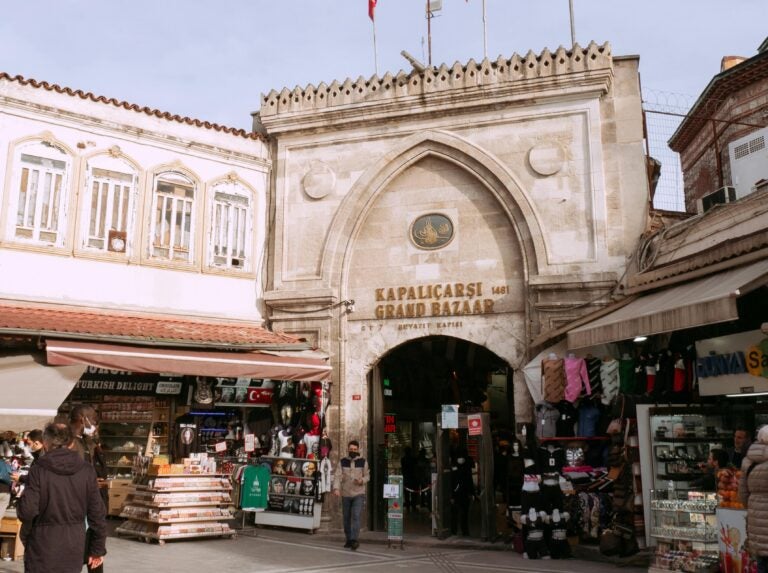Best currency to use in Turkey: Traveler’s Guide
Euros or Liras? Here's which currency will get you the best deals during your Turkish adventure.
You’re on holiday in Istanbul, strolling through the Kapalıçarşı bazaar when you spot the perfect souvenir to take home. In one pocket, you have Turkish liras. In the other, you’re carrying a fair amount of euros.
You’re well-acquainted with the euro’s worth and can easily spot a good deal from a bad one. However, Turkish liras are the local currency, so you know they’ll be accepted.
Which should you use to buy the gift?
In this article, we cover the best currency to use in Turkey. You’ll learn if paying with euros is a good idea and how to get the best exchange rates to ensure you get the best deals during your Turkish adventure.
Can you use euros in Turkey?
Yes, you can use euros in Turkey. Depending on where you are, resorts, tourist attractions, hotels, and restaurants will be happy to take them.
However, vendors typically apply an additional fee for the cost of handling foreign currency. Plus, if you’re using a credit or debit card using euros, your bank might even charge a foreign transaction fee on top of the vendor’s markup.
This means you’ll often be getting a worse deal than if you paid with liras.
Where are euros accepted?
Euro acceptance depends on the area of Turkey you visit. Businesses in big Turkish cities, like Istanbul, Ankara, Antalya, Izmir, and Bodrum, will let you use euros and even accept other foreign currencies like dollars and pounds.
Some businesses that are especially accepting of euros throughout most of Turkey include hotels and resorts, larger shops, restaurants, and airports.
However, people in small towns and the countryside are more likely to only accept Turkish liras. On the other hand, hospitals that do hair transplants in Turkey or other elective procedures usually charge in cash and prefer foreign currency.
But just because euros are often accepted in Turkey, it doesn’t make them the best currency to use in Turkey.

Packing up and setting off? Don’t go before you check off all the boxes on the packing list for Turkey.
Pros and cons of using euros in Turkey
While typically more convenient, paying with euros in Turkey is generally disadvantageous as many businesses will apply an additional fee or higher exchange rate.
Plus, businesses will almost always return change in liras regardless of the currency you pay in. If you’re not used to the lira’s worth, it can be difficult to understand if you’ve been given the right change.
| Currency | Pros | Cons |
|---|---|---|
| Turkish lira (TRY ₺) | – Accepted all over Turkey – Helps you avoid hidden fees and mark-ups for foreign currency – You’re getting a better deal | – Turkish liras can be volatile, occasionally devaluing – Might be less familiar to some travelers, making it hard to understand pricing |
| Euros (EUR €) | – Can be more convenient if you have more experience using the currency – Currency stability can guard against potential devaluations of the lira | – Many merchants apply additional exchange fees – Exchange rate will be higher than market rate in some places, such as shops – Some places might not accept Euros (especially in small towns and the countryside) – You’ll get change in lira. It can be confusing to assess if you’re getting the right change. |
So, what is the best currency to use in Turkey?
Now for the burning question: Is it better to use liras or euros in Turkey?
All things considered, the Turkish lira is the best currency to use in Turkey — surprising, we know. Everywhere accepts liras, and using them lets you avoid the costly exchange fees many businesses add to mid-market conversion rates.
That being said, there are certain instances where it might be better to have euros on hand, or even other foreign currencies like dollars or pounds. As of writing this, one euro is approximately 50 Turkish liras.
However, the Turkish lira has been unstable for the last five years. Given its volatile history, there’s no telling if it might dramatically dip again.
If such a fluctuation did happen while you were in Turkey and the foreign currency exchange rate suddenly changed, euros would give you more purchasing power as a protected currency. Put simply, they’d be worth more — that’s why we suggest carrying some in case of an emergency.
Where can I exchange euros for Turkish lira?
If you don’t have any liras on hand, don’t fret. The good news is that there’s no shortage of places for foreign exchange:
- Banks: All Turkish banks will be able to exchange euros. Some of the most reputable banks to look out for include Zirat, Garanati, and Isbank.
- Physical currency exchange stores: In most cases, a physical currency exchange store will offer the most favorable exchange rates with minimal fees.
- ATMs: Convenient, but getting liras via ATM means that your bank will likely charge an additional fee since it’s a foreign transaction.
- Hotels and resorts: While many list their prices in euros, hotels and resorts let you exchange your currency for liras at their checkout counters. Some may even have dedicated exchange desks.
- Airports: For example, Istanbul Airport has exchange kiosks on the departure floor, in the international terminals, and in the domestic terminal on floors D and F.
Tips for getting the best exchange rate
If you want to save money on your trip (who doesn’t?), then it pays to be picky about where, when, and how you exchange your euros.
The mid-market exchange rate can fluctuate too. Here are some tips for Turkey exchange rates:
- Check conversion rates online: One euro is approximately 37 liras, but the rate can change from hour to hour. Be sure to check before you exchange; that way, you know if you’re getting a fair deal. You might need a Turkey SIM card for tourists to stay online and check exchanges on the fly.
- Currency exchange shops are your best bet: They typically exchange at the closest to mid-market rates, with very small fees, or sometimes none at all, making them the best physical currency exchange service.
- Avoid paying in euros as a way to get liras: Especially in local shops and bazaars. Rates are at the merchant’s discretion despite official currency exchange rates.
- Exchange currency in Turkey: Rates for liras will always be better inside the country than outside. While euros might be the best currency to take to Turkey, exchange money for liras when you arrive.
- Avoid hotel desks and airports when possible: While they do offer currency exchange services, both resorts and terminal kiosks tend to apply a much larger exchange fee.
- Best rates are when banks are open, from 9:00 AM-17:00 PM and in the middle of the week, from Tuesday to Thursday: Foreign currency exchange rates fluctuate. They’re typically higher after banks close and during the weekend.
Need to stay connected on the bustling streets of Istanbul? Here are the best eSIM options for Istanbul with spotless connectivity.
Stay connected on your trip to Turkey with Holafly
From the Kapalıçarşı bazaar to the Aga Sofia, there’s no shortage of wonderful sights to see in Turkey. And, of course, the occasional splurge for kebabs, baklava, and Turkish delight will take your experience to the next level.
Whatever you intend to buy, we recommend doing it with liras. There are plenty of places for currency exchange, and they’re accepted everywhere, helping you sidestep steep exchange rates and get the best bang for your buck.
Speaking of the best deals, you’ll need data to find them, especially if it’s your first time. And for that, we recommend going with an eSIM.
The Holafly eSIM for Turkey gives you unlimited data that you can activate digitally and use your phone in Turkey without the use of a physical SIM card. Send pics back home, browse social media, and use Google Maps to find the best places to visit.
Holafly is your trusted travel companion, helping you get connected and giving you peace of mind throughout your Turkey trip.





 Language
Language 


















 No results found
No results found





